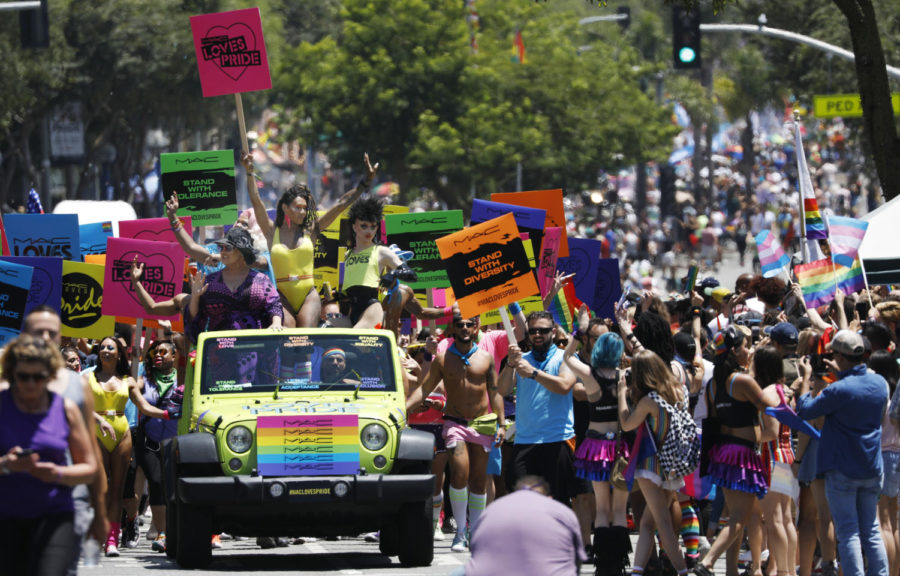UC San Diego starts referring to Latinos as ‘Latinx’ in cultural shift
The annual Pride Parade in West Hollywood, Calif. was expected to draw tens of thousands of people June 10, 2018. (Francine Orr/Los Angeles Times/TNS)
December 3, 2018
The University of California, San Diego has begun using new words to refer to Latinos and Chicanos to reflect the change occurring nationally in tow many people define their gender and sexuality.
The “gender specific” terms Latino and Chicano are being selectively replaced with “Latinx” and “Chicanx.”
The change was promoted by students, social justice activists and the LGBTQ community, which are trying to get people to look beyond conventional notions of gender, sex and appearance.
As broadly used, Latino refers to people of Latin American origin or descent.
Latinx includes men and women of Latin American descent, people who are not exclusively male or female, people who don’t think of themselves as men or women and people who don’t act or dress in ways that are common to people of their gender.
The same basic definition applies to Chicanx, with the exception of heritage. Chicanos are Americans of Mexican descent.
“This is about making the university more inclusive,” said Becky Pettit, UC San Diego’s vice chancellor of equity, diversity and inclusion. “We’re meeting students where they are.”
The university also is trying to more broadly appeal to Latinos and Hispanics, an area where it has lagged behind some University of California campuses.
The word changes, made last week, mean that the school will use Latinx and Chicanx in a lot of its official communications, such as news releases. The words also might end up being used in the naming of certain campus events.
Schools like Grossmont and MiraCosta colleges already use those terms in their publicity. So does UC Irvine. The University of San Diego holds a Chicanx-Latinx graduation.
But deeper change is being sought. And it involves two words — Latinx and Chicanx — that are not widely used by the general public, partly because there’s confusion about what the words mean, and how they are pronounced.
People are especially perplexed by Latinx, which was reflected in a reader survey published this year by Remezcla, a media company.
The survey found that readers were almost evenly divided between pronouncing Latinx as “latin-x” and “la-teen-x.” A small percentage preferred “lah-tinks.” Still others have suggested referring to Latinos as Latin@, a gender-neutral term that hasn’t caught on.
Colleges and universities are often among the first places new words and language appear.
At UC San Diego, it is no longer uncommon for a person to announce their “personal pronouns” when they introduce themselves at a meeting.
For example, a person might say, “my pronouns are he/him/his” or “she/her/hers.” Or they could ask to simply be referred to as “they” because their gender identity doesn’t neatly match that of a man or a woman.
The issue of gender identity also has surfaced in how students apply for undergraduate admission to the University of California system.
Students can now choose from heterosexual/straight, bisexual, gay, and lesbian to describe their sexuality.
Under gender, they can select, gender non-conforming, genderqueer, transgender, trans man, trans male, trans woman or trans female.
Making a selection _ which is voluntary _ can be confusing. Some of the terms aren’t well-known to the general public, and some have multiple meanings.
The UC says that genderqueer refers to “a person whose gender identity and/or gender expression falls outside of the dominant social norm of the assigned sex, is beyond genders, or is some combination.”
The new California Gender Recognition Act is likely to make all of these terms more familiar to a wider audience. The act, which begins to take effect on Jan. 1, will make it easier for people who are transgender, nonbinary or intersex to obtain state-issued IDs that specify their gender.
“Terms and practices change over time,” said Dayo F. Gore, an ethnic studies professor at UC San Diego. “It doesn’t mean it is a zero-sum game. The important thing is how do we think about the changes. It gives us a chance to be open and speak.”
Pettit, asked whether some people will view words such as Latinx as an act of political correctness, said: “I think the nature of higher education as institutions is to create spaces for resistance and for people to redefine themselves and for people to redefine the world that they want to live in,” Pettit said.
“I don’t mean to sound flippant but that’s what universities exist for: to allow people to think freely, to allow people to redefine and shift culture.”








